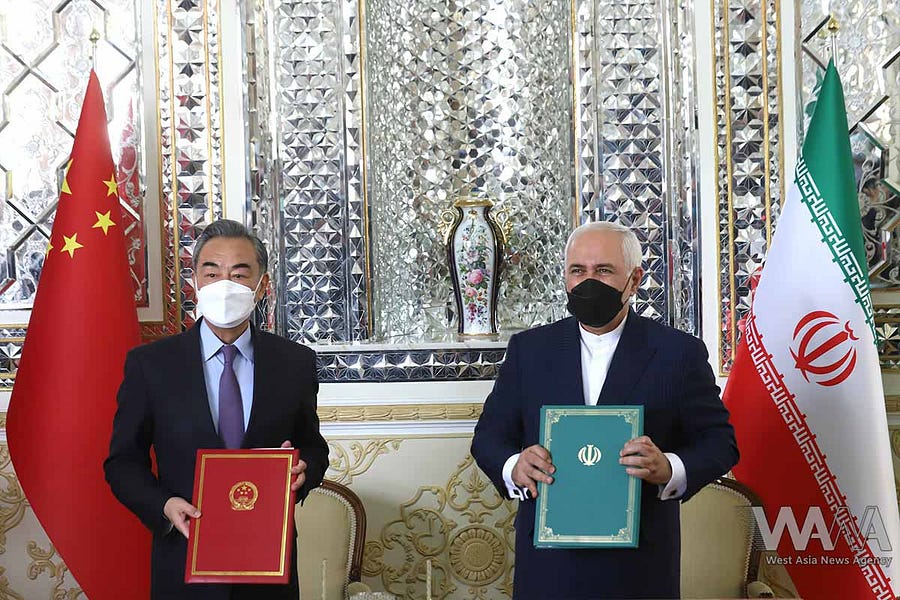Happy Monday! Rejoice, for the Suez Canal boat is finally afloat! And a happy Passover and Palm Sunday to those who celebrated over the weekend.
Quick Hits: Today’s Top Stories
-
Military and police forces in Burma killed dozens of protesters on Saturday—reportedly more than 100—marking the deadliest day since last month’s coup. Secretary of State Antony Blinken said the Biden administration is “horrified” by the violence, and that the “courageous people of Burma reject the military’s reign of terror.”
-
Ethiopian Prime Minister Abiy Ahmed said Friday that Eritrea has agreed to withdraw its troops from Ethiopia’s Tigray region following months of armed conflict in the area that has reportedly killed thousands and displaced millions. Abiy said the Ethiopian military will replace the vacating Eritrean troops.
-
In a move designed to counter the United States, Iran and China signed a 25-year strategic cooperation agreement on Saturday to boost military and economic relations between the two countries.
-
U.S. Customs and Border Protection announced over the weekend that a 9-year-old girl drowned in the Rio Grande attempting to cross the U.S. border. Agents found the girl—along with her mother and three-year-old sibling—unresponsive and stranded on an island. The agents were able to resuscitate the mother and three-year-old child.
-
Documents leaked to Axios show the Biden administration projects the number of unaccompanied migrant children crossing the U.S.-Mexico border to jump from 16,000 in March to as many as 26,000 in September. Prior to this year, the single-month record was 11,475 in May 2019.
-
The Chinese government imposed retaliatory sanctions against a handful of American and Canadian civilians over the weekend in response to U.S. and Canadian sanctions on Chinese individuals involved in the persecution of Uyghur Muslims in Xinjiang.
-
Dominion Voting Systems filed a $1.6 billion defamation lawsuit against Fox News on Friday, alleging the company “sold a false story of election fraud in order to serve its own commercial purposes.”
-
The United States confirmed 40,432 new cases of COVID-19 yesterday per the Johns Hopkins University COVID-19 Dashboard, with 3.4 percent of the 1,186,483 tests reported coming back positive. An additional 481 deaths were attributed to the virus on Sunday, bringing the pandemic’s American death toll to 549,306. According to the Centers for Disease Control, 32,573 Americans are currently hospitalized with COVID-19, and 3,281,956 COVID-19 vaccine doses were administered yesterday. 93,631,163 Americans have now received at least one dose.

China and Iran Teaming Up
The foreign ministers of Iran and China met Saturday to sign a sweeping “comprehensive cooperation” partnership, strengthening the two countries’ growing interdependence in the realms of security and economics. While the text of the agreement remains secret, it lays the groundwork for Beijing’s investment in various Iranian sectors at a time when Tehran’s economy is reeling from the dual impact of U.S. sanctions and COVID-19.
Iran’s foreign ministry has claimed that the document “does not include numbers on investment or financial and monetary resources,” but an earlier draft of the agreement obtained by the New York Times last year showed China agreeing to invest $400 billion in Iran over the course of 25 years. In exchange, Iran plans to export oil to China at a heavily discounted rate.
“The relations between the two countries have now reached a strategic level and China is seeking to promote inclusive relations with the Islamic Republic of Iran,” China’s foreign minister, Wang Yi, said during the ceremony. “The signing of the roadmap for strategic cooperation between the two countries shows the will of Beijing for promoting ties to the highest possible level.”
While China’s push into the region dates back to the Iran-Iraq War, the latest chapter of Sino-Iranian relations began in earnest with Chinese President Xi Jinping’s 2016 visit to Tehran. The two countries have been strengthening their strategic ties ever since, in part due to their mutual competition with and sanctioning by the U.S. government. Iran’s Ambassador to China and Mongolia, Mohammad Keshavarzzadeh, insisted that the agreement is not targeting a third country in a tweet Saturday, but experts have observed the pact draws a clear line in the sand.
The pact “would lead to joint military training and exercises, research and weapons development, and sharing of intelligence—in theory focused on fighting drugs, terrorism, human trafficking, and cross-border crimes but in practice inevitably enhancing Iran’s capability to deal with its Arab neighbors and the U.S.,” Center for Strategic and International Studies expert Anthony Cordesman wrote back in July when a draft of the agreement first circulated. “China has taken these steps for both economic reasons and because it has clear strategic reasons to compete with the U.S. for influence and power projection capability in the region.”
The heavy financial investment—one of many which China has deployed around the world to spread its political influence—will dedicate billions to Iran’s oil, gas, transportation, technology, and manufacturing sectors, where Beijing’s cash is badly needed. After two years of the Trump administration’s “maximum pressure” campaign, Iran’s economy has been iced out of global trade, and is on the verge of collapse. The agreement is expected to help Tehran evade sanctions and develop its domestic industries at a time when the Biden administration’s intentions regarding the Joint Comprehensive Plan of Action remain unclear.
“Excellent exchange on expansion of global, regional and bilateral cooperation in the context of our comprehensive strategic partnership,” Iranian Foreign Minister Mohammad Javad Zarif tweeted Saturday. “China is a friend for hard times” amid the U.S.’s “oppressive sanctions,” he said after the signing.
Other Iranians aren’t so enthusiastic. #No2ChinaIRAccord circulated on Twitter over the weekend as Iranians shared their opposition to the plan. “The Islamic Republic has transferred control of many cities and the Persian Gulf to the Chinese regime for its own survival only, which is more shameful than selling its territory. The Chinese regime must leave Iran,” one user wrote.
As the American Enterprise Institute’s Michael Rubin explained in a post Sunday, Iran is “scarred by history” after hosting a series of foreign occupiers over the course of several hundred years. While the Chinese Communist Party (CCP) has never been among Iran’s many invaders, this move by Tehran nevertheless threatens its already fraught relationship with its populace.
“Iranian leaders have lost touch with their public. They may look at their China embrace as a way to stick a thumb in the American eye, but ordinary Iranians do not see the United States as the problem, but rather their own regime’s reactionary policies,” Rubin writes. “To believe that their own anti-Americanism justifies a wholesale lease of Iranian sovereignty is a tremendous miscalculation, one that will only further Iranian antipathy toward their own government.”
Worth Your Time
-
If you’ve been online in the past week, odds are you’ve stumbled across some variation of the “it’s easier to buy a gun in this country than it is to vote” line, which represents a significant distortion of the facts. “Gun control advocates often embrace the narrative that guns are freely available in stores to anyone who wants one. Maybe they’ve never tried to buy a gun, and perhaps they don’t know any gun owners,” Trevor Burrus writes for Reason. “In this and so many other ways, the gun debate is actually a culture debate. Guns are similar to voting in that people imbue them with deep significance and get fiercely riled up about restrictions. Within political tribes, your stance on gun rights or voting rights is a signaling device—but it’s still important to get your facts straight.”
-
A recent survey from the Republican polling firm Echelon Insights asked voters what they think the goal of politics is: Enacting good public policy, or ensuring the survival of the country as we know it. Democratic respondents were a net +9 for enacting good public policy, while Republicans were a net +21 for ensuring the country’s survival. Echelon co-founder Kristen Soltis Anderson joined the Ezra Klein Show to discuss what this finding means, and much more about the future of the GOP. “If you look at 30 somethings, as millennials move into that bloc and as the Gen Xers move out, it’s becoming more progressive as well,” Anderson says, outlining a “real threat” to the future of the Republican Party. “We’re getting older. We’re doing all of those things Republicans said were going to make my generation more conservative. We’re having kids and buying homes and paying taxes, and it’s not really moving the needle further to the right.”
Presented Without Comment
Also Presented Without Comment
Toeing the Company Line
-
On the site today: Chris Stirewalt on the First Amendment, and John Hart on the need for the GOP to return to first principles if it wants to mount an effective resistance to Biden’s agenda.
-
In Sunday’s French Press, David and his wife, Nancy, uncover the “worst Christian sex abuse scandal you’ve never heard of.” Pete Newman spent years grooming and abusing boys at Kanakuk Kamps, one of the largest Christian camps in the country, where Newman worked as director. Drawing on testimony from several parents, former campers, and one family who refused to sign a nondisclosure agreement, David and Nancy explain how the camp spent years shielding the horrific scandal from public view. “A false narrative has circulated about Kanakuk for a decade, and parents have sent children to the camp without knowledge of its history or access to material facts,” they write. “Nobody resigned as a result of the failure to stop a decade of abuse. There was no disciplinary action against any of Newman’s supervisors.”
-
Former CDC Director Dr. Tom Frieden joined Sarah and Andrew on Friday’s Dispatch Podcast to discuss all things related to COVID vaccines. How can community leaders and public officials work to assuage doubts and overcome vaccine hesitancy? What do we actually need to know about the COVID-19 variants circulating?
-
Sen. Elizabeth Warren tweeted on Friday that she wants to fight to break up Amazon so that the e-commerce giant won’t be “powerful enough to heckle senators with snotty tweets.” In his latest G-File, Jonah argues the sentiment demonstrates the Massachusetts senator misunderstands her own role. “I’m sure Warren has lots of reasons for wanting to break up Big Tech, but she didn’t list them here,” he writes. “By her account she thinks insufficient fear of Elizabeth Warren, the Cambridge Slay Queen, is justification alone for swinging her scythe. That disturbs me far more than literally anything Amazon or Jeff Bezos have ever said or done.”
-
In Friday’s Uphill, Haley took a look at how partisanship is stymieing progress on the creation of a 9/11-style January 6 commission. “House Speaker Nancy Pelosi’s initial proposal for the commission was deeply partisan and hobbled the conversation from the get-go,” Haley writes. “Her draft resolution would empower top Democrats to select seven members of the commission, while Republican leaders would appoint only four. The original 9/11 commission was equally divided, consisting of five appointees made by Republicans and five made by Democrats.”
Let Us Know
Kristen Soltis Anderson’s point about millennials not becoming more conservative as they age struck us as an interesting one. What do you think accounts for this, and does it comport with your own experience?
Reporting by Declan Garvey (@declanpgarvey), Andrew Egger (@EggerDC), Haley Byrd Wilt (@byrdinator), Audrey Fahlberg (@FahlOutBerg), Charlotte Lawson (@charlotteUVA), Ryan Brown (@RyanP_Brown), and Steve Hayes (@stephenfhayes).







Please note that we at The Dispatch hold ourselves, our work, and our commenters to a higher standard than other places on the internet. We welcome comments that foster genuine debate or discussion—including comments critical of us or our work—but responses that include ad hominem attacks on fellow Dispatch members or are intended to stoke fear and anger may be moderated.
With your membership, you only have the ability to comment on The Morning Dispatch articles. Consider upgrading to join the conversation everywhere.